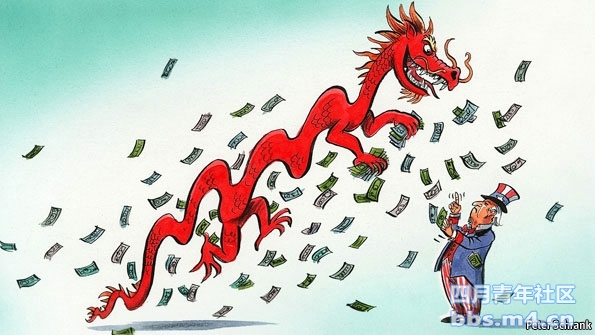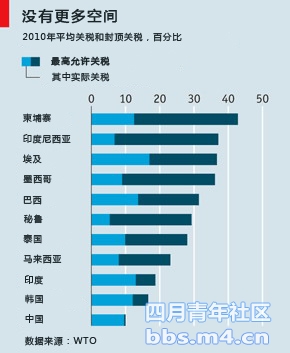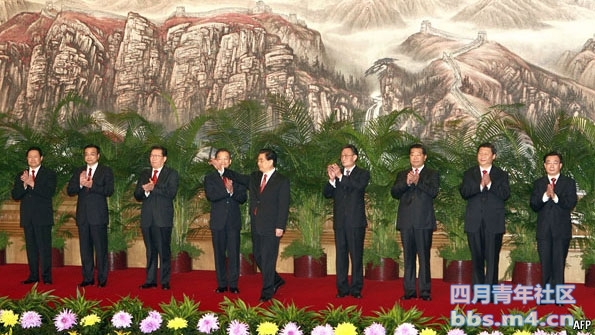|
|
【中文标题】世贸十年 - 改变了一切,一切也并未改变
【原文标题】China’s economy and the WTO
【登载媒体】经济学家
【原文链接】http://www.economist.com/node/21541448
在下面两篇文章中,我们检视了中国在十年前加入世贸组织后发生的变化。首先是经济,然后是政治。
经济——改变了一切

世界贸易组织(WTO)就像很多俱乐部一样,不允许退出的老成员有自动重新加入的权力。当中国在1949年共产主义革命后不久退出这家组织的前身之后,它不得不等待了15年,才在80年代具备了重新申请加入的资格。大门终于在2001年12月11日为他打开了,就是十年前的这个星期。
入世的代价就像长期的等待一样令中国痛苦不堪,它必须要放松大约7000类产品的关税、定额和其它贸易壁垒。有些人担心外国公司强大的竞争力会让农民流离失所,让陈腐的国有企业彻底崩溃。从某种程度上说,这样的事情的确发生了。但总体来看,这十年是中国在全球经济历史上最辉煌的时期,它的GDP翻了四倍,出口额几乎翻了五倍。
外国公司同样享受到了巨大的利益。据加利福尼亚大学圣克鲁兹分校的K.C. Fung所说,美国在中国的投资回报率是13.5%,而世界其它地区的平均回报率是9.7%。中国平均的关税标准低于巴西和印度。中国实际的关税征收标准,与WTO条约所规定标准间的差距异乎寻常的小。中国无法和它的第三世界同仁们采取相同的行为,即使想提升关税,也不能这么做。

然而对美国这个中国最大的贸易伙伴来说,民众对其态度逐渐转为负面。在最近一次民意测验中,61%的美国人认为中国近期的经济扩张对美国不好,只有15%的人认为美国会因此而受益。部分原因在于中国富有争议的汇率政策。中国的批评人士认为,中国为加入WTO放弃了一些重商政策,而现在,压低汇率成为了替代手段。
外国人的沮丧情绪也可以算做是中国成功的某种标志。随着经济的增长和成熟,竞争也更加激烈。外国公司在那些原本无需操心的低利润市场中为贸易战失败而悲痛不已,他们还在一些原来不存在竞争对手的市场中面对当地新崛起的强敌。
电子支付就是一个例子。中国第一张支付卡是由万事达在1986年发行的,直到中国加入WTO的时候,外国品牌依然占据着市场统治地位。但很快,中国中央银行成立了一个本土的竞争对手——中国银联,并且赋予它在商家和银行间结算本地货币的垄断地位。据尼尔森报告所说,这样的挫折本来对外国公司来说也算不得什么,如果不是中国的电子支付市场在过去十年中增长10倍,达到1.6万亿的规模的话。
中国的经济发展速度超过了所有人的预期,但其经济哲学却没有相等地发展。龙永图曾经帮助中国加入WTO,他在近期说,中国目前与WTO的原则距离越来越远。为了让其经济尽快实现现代化,它拘泥于工业政策、国有企业和本国技术保护主义。
很多外国公司都感到,自己与之竞争的不是中国公司,而是中国这个国家。在这两者之间,中国的中央政府和地方政府拥有10万家公司,还毫无保留地支持着更多公司。多亏有了WTO,外国公司不再需要用技术换取进入中国市场的资格,但有时依然会受到无形的压力。中国同时也在发展自己的企业和技术标准,比如3G移动电话。
很多干涉行为如果不能被确定为触犯WTO白纸黑字的条款,那么至少也违背了其精神。据一位美国前贸易谈判代表说,美国面对中国所做出的让步要比在日内瓦面对多个国家时让步的幅度大很多。部分原因在于美国公司担心,如果他们提出中国违背世贸协定的证据,将会受到中国政府的惩罚。还有一些原因是,中国的很多行为都属于政策的灰色地带,WTO很难监管。
然而从另一方面来看,中国越来越适应WTO的制度了。新加坡管理大学的Henry Gao指出,在加入世贸组织的最初几年,它尽量避免正面冲突。例如在2006年,美国威胁要投诉中国对牛皮纸瓦楞箱的关税,中国在第二天就把关税提高了。但现在的中国变得圆滑、世故了,他们会主动采取一些行动。一家华盛顿智囊团彼德森研究所的Nicholas Lardy说:“他们会捍卫自己的权力,也会主动发起一些行动。当他们得到不利的裁决时,他们会遵守这个结果。”
在某些事件中,歧视的现象不像以前那样严重,透明度要好得多。作为WTO协议的一部分,现在的中国准备颁布法律和规定的时候,会提前30天发布草稿文件征求意见,这让外国人更容易发现其违规的行为。美国最近抱怨中国没有向WTO公布将近200个补贴项目,包括一些绿色能源技术。美国之所以了解这些问题,部分原因是中国在执政透明的基础上,利用互联网公布了类似的项目细节。前谈判代表说:“这种信息在以前都属于‘内部的’。”
中国奉命的贸易政策,或许比WTO成员为中国打开俱乐部大门时所期望的要丑陋一些,但这只是因为它让自己置身于聚光灯下。
政治——对WTO引发政治变革的期望至今一无所获。

当美国前总统比尔克林顿在2000前劝说国会批准中国加入世贸组织时,他知道如何赢取这些多疑者。他说,允许中国入世,有可能“对人权和政治解放产生深远的影响”。十年之后,中国那些失望的自由主义者不再相信自由贸易可以加速政治改革。
中国的媒体在12月11日大肆庆祝这个国家加入WTO十周年纪念日。这个事件对中国和美国同样具有重要的意义,而不仅仅是中国对消除贸易壁垒的承诺(当然这方面还需要持续努力)。对双方来说,更重要的是让两国关系恢复平静,国会每年都在激烈辩论,是否应当继续中国的贸易最惠国待遇(美国大部分贸易伙伴都享有这样的待遇)。在克林顿先生的讲话后,国会在2000年的激烈投票最终结束了每年回顾一次的程序,确保美国将分享因中国为加入WTO所做出的承诺而获取的所有利益。
中国官员和克林顿先生的想法不一样,他们不认为WTO会带给中国“异乎寻常的变化”,无论在经济方面还是政治方面。西方人对此深信不疑主要是来源于一些中国异见分子的大力吹捧。(克林顿先生曾引用任畹町的话说:“从前,天是黑的,现在,天亮了。这将是一个全新的开始。”)
前国家总理朱镕基虽然被很多西方人视为中国的经济改革家,但他也并不赞成这种观点。最新出版的朱先生四卷讲话稿——其中很多内容属于首次面世——显示他和党内强硬路线人士一样担心西方削弱共产党在中国领导权的企图。有一段首次解密的讲话是这样的,在中国加入WTO四个月之后,他对省级官员们说:“西方敌对势力依然在奉行全盘西化的策略,试图分裂我们的国家。”他谴责那些阴谋策划社会不稳定局势的人,指的是2002年国有企业工人大规模的抗议事件。(相关独立观察人士认为,这起事件与外国势力毫无关系。)
朱先生在经济领域的改革热情,让这个国家表现出敢冒重大的政治风险以获取更加自由的市场经济的面貌。当时的党中央主席江泽民也主导了一些富有争议的宪法内容调整,允许私有企业主进入政治局。但中国自由人士心中的希望随着这十年的结束,也慢慢破灭了。
北京一家独立智囊团的创始人曹思源说,他和其它一些知识分子对于WTO促进国内改革,比如发展独立、健全的司法体系的能力过于乐观了。过去十年里的确发生了许多重大的社会变革,但大都是加入WTO之前的改革余波,比如房产私有化和放松对国内人口流动的管控。
共产党在明年将进行领导层的大换血,几乎没有人对于长期被遗忘的政治改革在短期内被提到日程上抱有希望。曹先生最近公开呼吁党内“中央与地方分权”,这可以作为中国民主化进程的第一步。他说,很多党内人士都支持这个观点,但没有人敢公开宣布。他说,8月份美国副总统拜登访问北京时,警察在他家门口驻防,确保他不会出门。
克林顿总统在讲话中说,加入WTO将让中国加速缩小国有经济的成分,那是“共产党力量的巨大来源”,这必将产生“深远的影响”。然而,很多自由人士在抱怨,国有企业不但依然掌控着国家经济的制高点,而且还越来越让私有企业难以撼动其地位。近年来,各地官员努力让党的触角伸到私有企业中。有些地方政府已经要求私有企业用总员工工资的5%来资助党在企业中的各种活动。
这就是十年前几乎所有中国人一致拥护的WTO成员身份在表面上的象征性地位,而北京的学者韩德强是一个鲜有的例外。他在《碰撞——全球化陷阱与中国现实选择》一书中曾经警告美国利用WTO让中国全盘西化的阴谋。他目前依然是一个激烈的批评人士,他说,卡尔马克思也会赞同经济解放必然产生政治变革的观点,“仅仅是时间问题。”克林顿先生或许会得到些许的安慰。
原文:
In two articles, we examine how China has been altered by its entry into the WTO ten years ago. First, the economy. Second, the political impact
THE World Trade Organisation (WTO), like many clubs, denies patrons the right of automatic readmission. Having quit the organisation’s predecessor shortly after the Communist revolution of 1949, China had to wait 15 long years to gain entry after reapplying in the 1980s. The doors finally opened on December 11th 2001, ten years ago this week.
The price of re-entry was as steep as the wait was long. China had to relax over 7,000 tariffs, quotas and other trade barriers. Some feared that foreign competition would uproot farmers and upend rusty state-owned enterprises (SOEs), as to some extent it did. But China, overall, has enjoyed one of the best decades in global economic history. Its dollar GDP has quadrupled, its exports almost quintupled.
Many foreigners also prospered. American foreign direct investment reaps returns of 13.5% in China, compared with 9.7% worldwide, according to K.C. Fung of the University of California, Santa Cruz. China imposes lower tariffs on average than Brazil or India. The gap between what it can charge, under WTO rules, and what it does charge is also unusually small. So unlike its peers, China could not raise tariffs much even if it wanted to (see chart).
Yet in America, China’s single biggest trading partner, sentiment towards the country has turned starkly negative. In a recent poll, 61% of Americans said that China’s recent economic expansion had been bad for America; just 15% thought it had been good. This partly reflects China’s controversial currency regime. By keeping the exchange rate down, China’s critics allege, it has gained a substitute for the mercantilist measures it gave up to join the WTO.
Foreign frustration is partly a sign of China’s success. As its economy has grown and matured, the stakes have risen. Foreign firms lament losing trade battles they might not bother to wage in a less lucrative market. They also face competition from local upstarts in markets where no such rivals previously existed.
Electronic payments are one example. China’s first ever payment card was issued in 1986 by MasterCard. Foreign brands remained dominant at the time of China’s WTO entry. But shortly afterwards, China’s central bank established a domestic competitor, China UnionPay, and gave it a de facto monopoly over the handling of local-currency payments between merchants and banks. This setback might have been easier to take for foreign companies had the market not since grown tenfold, to $1.6 trillion, according to The Nilson Report, an industry newsletter.
China’s economy has evolved faster than anyone hoped. But its economic philosophy has not. Long Yongtu, who helped China win admission to the WTO, recently said that China is now moving further away from the organisation’s principles. To modernise its economy, it has remained wedded to industrial policies, state-owned enterprises, and a “techno-nationalism” that protects and promotes home-grown technologies.
Many foreign companies feel they must compete not with Chinese firms but with the Chinese state. Between them, China’s central and local governments own over 100,000 companies and implicitly favour many more. Thanks to the WTO, foreign firms are no longer required to hand over technology in exchange for entry to China’s market. But many still feel an informal pressure to do so. China is also keen to promote its own firms by enforcing its own technological standards, such as for 3G mobile phones.
Many of these interventions violate the spirit, if not always the letter of WTO rules. In response, America often pushes back bilaterally rather than in Geneva, according to a former American trade negotiator. This is partly because companies worry they will face retribution from China’s government if they provide evidence against it in a trade case. It is also because much of what China does falls into a grey area that is not easy for the WTO to police.
China, on the other hand, is growing more comfortable with the WTO machinery. In its early years as a member, it shied away from confrontation, points out Henry Gao of Singapore Management University. In 2006, for example, America threatened to file a complaint over China’s duties on kraft linerboard. China lifted the duties the next working day. But now the Chinese have learned the ropes, they have also become more proactive. “Now they defend themselves,” says Nicholas Lardy of the Peterson Institute, a Washington think-tank. “They initiate cases. And when they lose, they comply.”
In some cases the discrimination is no worse than before, it is simply more visible. As part of its WTO agreement, China now circulates draft laws and regulations for 30 days to collect comments. That has made it easier for foreigners to spot foul play. America recently complained that China had failed to notify the WTO of nearly 200 subsidy programmes, such as those supporting green-energy technology. It knew this in part because China, following its newly transparent practice, had disclosed many such programmes online, the former negotiator said: “Similar policy announcements were neibu (for limited distribution) in the past.”
China’s trade policies may look a little uglier than WTO members had hoped when they opened the club’s doors ten years ago. But that is partly because the lights have been turned on.
No change
Hopes of sparking political change have come to nothing so far
WHEN trying to persuade Congress in 2000 that China should be let into the World Trade Organisation (WTO), America’s then president, Bill Clinton, knew how to win over the sceptics. China’s admission, he said, was likely to have “a profound impact on human rights and political liberty”. A decade on, China’s disappointed liberals no longer suggest that freer trade will speed political reform.
China’s media have been trumpeting the tenth anniversary on December 11th of the country’s WTO accession. In China as much as in America, the event was seen as of far greater importance than a mere pledge by China to reduce barriers to its markets (moves towards which had long been under way). For both countries it was a crucial part of restoring calm to a relationship that had been marred by annual fights in Congress over whether to keep granting China most-favoured-nation trading status (as enjoyed by most of America’s other trading partners). Mr Clinton’s remarks preceded bitterly contested votes in Congress in 2000 that ended the annual renewal process and ensured America would share any benefits from the market-opening measures pledged by China on entering the WTO.
Chinese officials did not share Mr Clinton’s belief in what he called the “quite extraordinary” change that the WTO would bring about in China, politically as well as economically. Such views were bolstered in the West by supportive comments from some Chinese dissidents. (“Before, the sky was black; now it is light. This can be a new beginning,” Mr Clinton quoted one of them, Ren Wanding, as saying.)
But even the man seen by many in the West as China’s arch (economic) reformer, the then prime minister Zhu Rongji, had no truck with such views. A recent four-volume set of Mr Zhu’s speeches, including many not previously published, shows him to have shared hardliners’ concerns about perceived Western efforts to undermine Communist Party rule in China. “Western hostile forces are continuing to promote their strategy of Westernising and breaking up our country,” he told provincial officials in one now-declassified speech, four months after China had joined the WTO. He accused such people of conducting “infiltration and sabotage” in an effort to foment instability, pointing to large-scale protests early in 2002 by workers in state-owned enterprises (independent observers detected little if any sign of foreign involvement).
Mr Zhu’s reformist zeal in the economic realm helped to foster the impression of a country willing to take considerable political risks in order to create a more market-driven economy. The then party chief, Jiang Zemin, was also pushing through a controversial revision to the party’s constitution to allow owners of private businesses to become members. But high hopes among some Chinese liberals faded as the decade wore on.
Cao Siyuan, who heads an independent think-tank in Beijing, says he and like-minded intellectuals were “over-optimistic” about the ability of the WTO to promote further change, such as the development of a robust and independent legal system. The last decade has seen huge social changes, but these have been a legacy mainly of pre-WTO membership reforms, such as the privatisation of housing and the loosening of controls on internal migration.
And with the Communist Party again facing a big leadership shuffle next year, few believe that long-neglected political reforms will be revived any time soon. Mr Cao has recently published a call for a “division of powers” within the party as a step towards making China more democratic. He claims many in the party support such a notion, but do not dare say so openly. Mr Cao says police stopped him from leaving his home during the visit to Beijing in August by America’s vice-president, Joseph Biden.
In his speech in 2000, Mr Clinton said that WTO membership would accelerate the shrinkage of the state-owned sector which had been “a big source of the Communist Party’s power”. This, he said, would lead to “profound change”. Many liberals complain, however, that remaining state firms not only still control the commanding heights of the economy but are in some cases stepping up their resistance to encroachment by the private sector. In recent years officials have increased their efforts to ensure that party cells are set up in private firms. Several local governments have started requiring private companies to contribute about 0.5% of their payrolls to sponsor party activities on their premises.
Such was the seeming status symbol of WTO membership a decade ago that few in China openly criticised the decision. A Beijing academic, Han Deqiang, was a rare exception. His book, “Collision: the Globalisation Trap and China’s Real Choice”, gave warning of an American plot to use the WTO to “Westernise” China. He remains a fierce critic. Karl Marx, he says, would have agreed with the view that economic liberalisation leads to political change. “It’s a matter of time,” he says. Perhaps Mr Clinton can draw comfort.
|
评分
-
1
查看全部评分
-
|